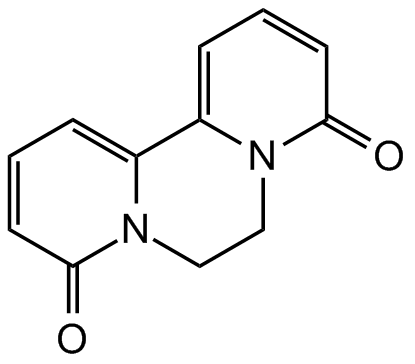Diquat metabolite dipyridone
| Code | Size | Price |
|---|
| CDX-D1098-M010 | 10 mg | £92.00 |
Quantity:
Prices exclude any Taxes / VAT
Overview
Regulatory Status: RUO
Shipping:
Ambient
Storage:
Short term: +4°C, Long term: -20°C
Images
Documents
Further Information
Alternate Names/Synonyms:
6,7-Dihydrodipyrido[1,2-a:2',1'-c]pyrazin-4,9-dion; 9,10-Dihydro-8a,10a-diazaphenanthren-1,8-dion; Diquat-dipyridon
Appearance:
Yellow to dark yellow to orange powder.
CAS:
35022-72-1
EClass:
32160000
Form (Short):
solid
GHS Symbol:
GHS06, GHS08, GHS09
Handling Advice:
Protect from light and moisture.
Hazards:
H301 + H311 - H315 - H317 - H319 - H330 - H335 - H372 - H410
InChi:
InChI=1S/C12H10N2O2/c15-11-5-1-3-9-10-4-2-6-12(16)14(10)8-7-13(9)11/h1-6H,7-8H2
InChiKey:
KCTKVKNCYCXHMV-UHFFFAOYSA-N
Long Description:
Chemical. CAS: 35022-72-1. Formula: C12H10N2O2. MW: BD9837. Diquat metabolite dipyridone is a common degradation product of diquat. Diquat is a nonselective, defoliant, preharvest, and non-residual bipyridyl herbicide and crop desiccant, normally used as the dibromide salt, to control broad-leaved weeds and grasses. Its activity is based on the liberation of the superoxide anion radical and, subsequently, hydrogen peroxide, leading to tissue destruction by oxidative stress. This compound can be used as a reference compound for analytical studies.
MDL:
MFCD30719733
Molecular Formula:
C12H10N2O2
Molecular Weight:
214.22
Package Type:
Vial
PG:
II
Precautions:
P273 - P280 - P302 + P352 + P312 - P304 + P340 + P310 - P305 + P351 + P338 - P314
Product Description:
Diquat metabolite dipyridone is a common degradation product of diquat. Diquat is a nonselective, defoliant, preharvest, and non-residual bipyridyl herbicide and crop desiccant, normally used as the dibromide salt, to control broad-leaved weeds and grasses. Its activity is based on the liberation of the superoxide anion radical and, subsequently, hydrogen peroxide, leading to tissue destruction by oxidative stress. This compound can be used as a reference compound for analytical studies.
Purity:
>96% (HPLC)
Signal Word:
Danger
SMILES:
O=C1N2CCN3C(C=CC=C3C2=CC=C1)=O
Solubility Chemicals:
Sligthly soluble in chloroform.
Source / Host:
Synthetic
Transportation:
Excepted Quantity
UN Nummer:
UN2811
UNSPSC Number:
12352200
Use & Stability:
Stable for at least 2 years after receipt when stored at -20°C.
References
(1) C. Fuke, et al.; Arch. Toxicol. 70, 504 (1996) | (2) C. Fuke, et al.; Legal Med. 4, 156 (2003)



